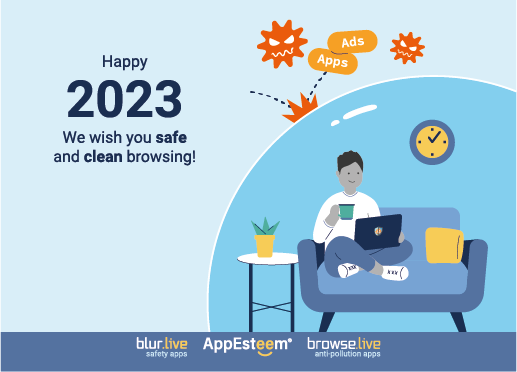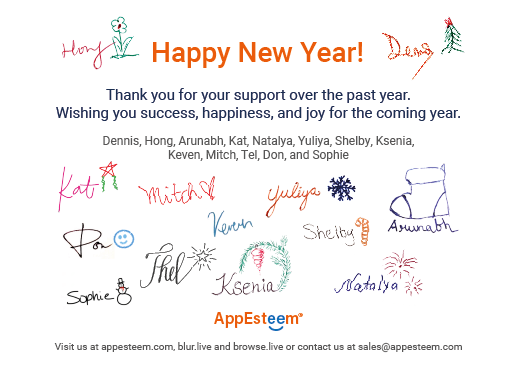
2022 was a busy year for AppEsteem. Here's what we accomplished:
- We moved forward with two new ACRs that affect the bundler industry: ACR-013 (which prevents interrupting install/uninstall/conversion with un-consented offers), and ACR-060 (which requires offers to disclose the offering network). These two ACRs are meant to reduce consumer confusion and dissatisfaction, and they will go into effect on April 1. You can read more about them, including the requirement, our intent, and our guidance, on our Requirements checklist.
- We took a stand against ad pollution by publishing pollution indicators, and publicly calling out our first set of ad polluters.
- We updated our browser safety consumer apps and services (available on Browse.live) by releasing Browse.live Ad Control, a free browser extension that blocks ads from ad polluters, and Browse.live Search, an ad-pollution-free, anonymous search engine.
- We called out hundreds of active Deceptors, and we certified hundreds of clean, consumer-respecting apps.
- We ran monthly tests against the main AV products to determine how good they were at blocking Deceptors and allowing certified apps.
Not bad for a year where we're mostly still working from home and postponing almost all customer visits.
In 2023, our mission won't change. We'll continue to help clean apps thrive by finding ways to protect consumers from getting tricked, scared, or fooled. Here's what we plan to focus on:
- We'll start enforcing the bundler ACRs (ACR-013 and ACR-060). We'll work to stop apps from violating these ACRs, including hunting for them, reaching out to them, and listing them on our active Deceptor list.
- We'll keep calling out Deceptors and Ad Polluters, so we can get them to clean up.
- We'll continue to expand our Browse.live consumer safety product line so that consumers can have safer and cleaner internet experiences.
- We'll look for more ways to encourage the AVs to better protect consumers, both on the system and in the browser. We'll do this with our feeds, our testing, our technology, and with releasing our own apps.
We're winning the fight against deceptive apps, and our clean ecosystem makes this possible. Thank you to our app makers who get their clean apps certified, our AV partners who use our Deceptor and Certified feeds to protect consumers, and our customers who use our Browse.live apps to make their internet experiences safer and cleaner.
Happy New Year from all of us at AppEsteem!

(Hong Jia and Dennis Batchelder)
We think that many AVs need to update their (potentially) unwanted software policies to make sure they can block apps that reduce security without first obtaining informed user consent. We gave a talk yesterday at AVAR 2022 in Singapore to make our case, show which AVs are currently struggling with protecting their customers against these apps, and ask them to update their policies so their customers can be better protected.
You can see the slides we used for the presentation here.
This was our abstract:
As Avs get better operationalized in their fight against unwanted software (UwS), their combined pressure is driving the software monetization industry toward finding the gaps in AV policies so they can continue to exploit consumers for easy money.
The big gap in AV policies these days, unfortunately, is around apps that make their computers more vulnerable to attacks. The result? A proliferation of apps that needlessly reduce their customers’ security postures and set them up for future attacks, without first obtaining informed user consent. Examples of these apps include VPNs that install self-signed trusted root certificates and free apps that monetize by installing proxies that share their internet connection and processor.
Lately these security-reducing apps that don’t obtain informed consent are grabbing public attention: articles about them are popping up in both security blogs and computer industry news. Some platforms and AVs are beginning to respond – they detect after others have called them out. But the platforms and AVs have been slow to update their policies, and slow to detect these apps as UwS, which leaves a gap that software monetizers continue to exploit.
Our session will show examples of how these apps reduce their customers’ security postures. We will highlight the platform and AV public policy gaps that have led to the spread of them. We’ll make suggestions as to how Avs can enhance their policies to better protect their customers from these apps.